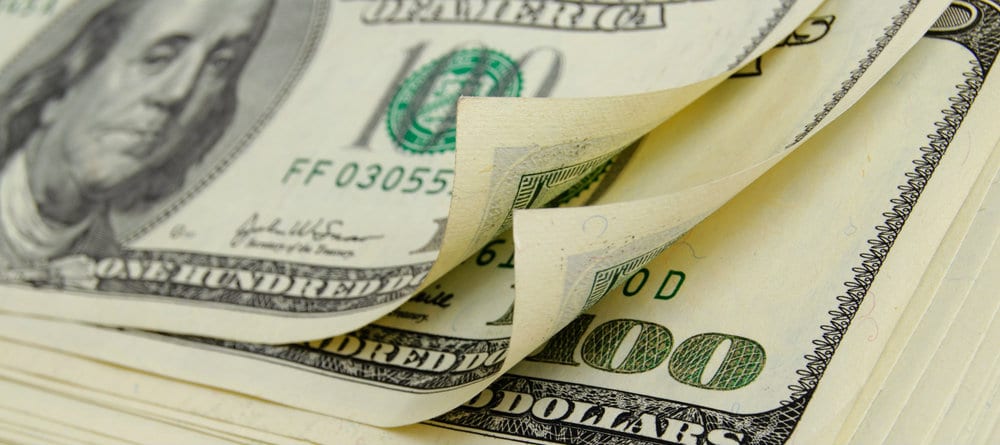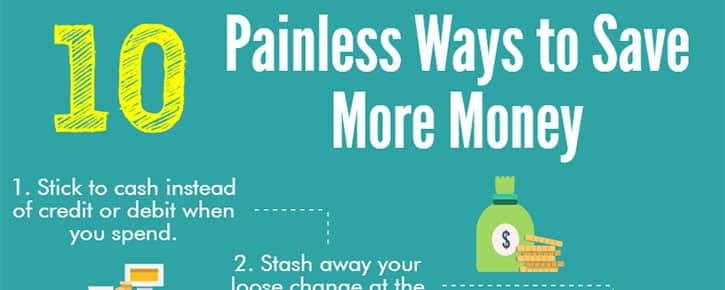A fat cushion of cash in the bank can certainly help you sleep easier at night but we all know that stashing money away is easier said than done. A 2016 survey from CareerBuilder[1] revealed that 75% of Americans live paycheck-to-paycheck.
If saving more is one of your goals but you haven’t been able to make much progress, don’t panic. Having a plan is the first step for getting your savings on the right track. To help you along the way, Credit Sesame has put together a comprehensive guide on everything you need to know to have a more financially rewarding life.
How to Save Money: Start With a Budget
Saving money isn’t rocket science but it requires a basic understanding of one of the most important principles of personal finance–spend less than you earn.
It seems pretty straightforward but when you consider how much debt Americans are in, it’s clear that many people struggle with this number one rule. As of June 2016, total revolving debt in the U.S. (which includes credit cards) topped $960 billion according to the Federal Reserve.[2]
So what’s the remedy when you’re ready to save more but you don’t know where to begin?
One word: budget.
What’s a budget and why should you care?

A budget, in the simplest terms, is a plan for how you spend your money each month. Think of it like a scale. On the left side, you’ve got all the money you make for that month. That includes your regular paychecks as well as any other money you receive, such as from investments or by doing odd jobs.
On the right side, you’ve got all of your expenses. That means fixed expenses like housing, transportation, food and insurance, and discretionary expenses like the money you spend on dining out, entertainment, travel and personal care.
The goal at the end of the month is for the income side to outweigh the spending side.
Your budget isn’t set in stone. It can change from month to month or year to year as your income and expenses change. The key is to know how to make a budget and even more importantly, how to stick with it.
Tip: The first step to budgeting is to find out where your money is going. Start with a free financial app like Mint or Prosper Daily to see where your cash is going. You might also be able to see categories by reviewing your bank account online.
Budget-making 101

If you’ve never made a budget before, it’s a fairly straightforward task. You simply list all of your expenses for the month. Then, add up all of your income for the month and subtract your expenses. If you’ve got money left over, that’s money you can use to jumpstart your savings. If you’re coming up in the red, that’s a sign that you spend too much and it’s time to pare back.
Break down your expenses into essentials and nonessentials. Nonessentials are anything that you don’t need to maintain a basic standard of living each month. Cable TV, magazine subscriptions, a gym membership or regular movie nights on the weekends. Expenses like these are the ones you need to be willing to cut back on or cut out altogether if you really want to get serious about saving.
Make this task easier by going on a 21-day financial fast. During this time, don’t buy anything that isn’t essential, and when you do spend, use cash. It may be hard, but by the time you get through it you’ll have a very clear understanding of what you truly need to spend money on.
Once you’ve pruned the nonessentials, take a closer look at your fixed expenses to see where you might be able to squeeze out a few extra bucks. If rent is your biggest expense, for instance, could you move someplace cheaper or take on a roommate?
If student loan payments eat up a big chunk of your take-home pay, first look into repayment options you might have. Federal student loans may be eligible for a repayment plan that lets you pay less now, gradually increasing the payment as your budget allows. You might also be able to defer payment until you are on stronger footing. You should also research refinancing and consolidation options, which might allow you to save money now by lowering your payments.
The more money you can add back to your budget each month, the more you’ll have to grow your savings.
Finding ways to save money without making yourself miserable

A budget can be your best friend if you’re trying to save your way to a richer life but it can backfire if you don’t approach it with the right mindset. One way people get budgeting wrong is by viewing the budget as a means of deprivation instead of as a tool for financial empowerment. Some rebel and go off on a spending binge to release those feelings of frustration.
A budget is your ticket to financial freedom. If the thought of living on a budget has you down in the dumps, here are some tips for keeping your eye on the savings prize.
1. Automate your savings
Building up a savings habit or any habit for that matter takes time and practice. Automation can make the adjustment a little less painful. Set up recurring transfers from your checking account to your savings account. It’s is one of the best ways to save money when you’re brand-new to it. By moving the money automatically, you have to work harder to get your hands on it for spending purposes.
2. Start small
Goal-setting is a good way to keep yourself motivated to save but only if your goals are realistic. If you decide that you want to save $10,000 in a year when you’ve never had so much as $20 in a savings account before, you’re setting yourself up for a big disappointment. Start with smaller goals—say, socking away $25 a week til you hit your first $500—so that your goal is achievable. Then you can celebrate victory and up the ante when you reach your target.
3. Look for ways to beef up your income
Money to save comes by two roads: spend less, or earn more. If you’ve trimmed down your spending but you’re still not saving as fast as you’d like, earning more may be the answer. We don’t have a secret formula for how to make a lot of money but we do have some pointers for maxing out your paycheck. Taking on more hours at your current job is one option. Asking for a raise is another. If you can’t do either, consider getting a part-time gig or starting a side hustle. Could you drive for Lyft or Uber? All of these can lead to a boost in income, which could boost your savings in turn.
Q&A: How much do I save for emergencies?
An emergency fund is your lifeline when – not “if” – the unexpected happens. You might be laid off from your job, your car could break down, or you might want to travel to a loved one’s funeral across the country. You need a safety net, no matter who you are. If you don’t have anything in emergency savings, $1,000 is a good starting goal. From there, work your way towards three months’ expenses, and then six months’ worth. The more you earn, the bigger your safety net should be.
Well-off people should stash away enough to live on for a full year with no income. Keep this money in an account that’s accessible so you can get your hands on it when you need it, not, for example, in a Certificate of Deposit that will incur penalties for early withdrawal.
(Practically) Painless Money-Saving Tips

Some of the best ways to save money are strategies people often overlook. If you’ve made up a budget but you’re still looking for extra dollars and cents, take a look at these helpful saving money tips.
Pay in cash. Debit and credit cards are convenient but studies show that we spend more when we swipe plastic versus handing over paper money.
Collect your loose change daily. Once you make the switch to cash, set up a jar for any loose change that ends up in your pocket or purse each day. All those pennies, nickels, dimes and quarters can add up to more savings faster than you might think.
Eliminate grey charges. Grey charges are small fees that can drain your savings potential in a big way. Go the extra distance to your own bank’s ATM and avoid paying a fee to withdraw cash. Dump recurring subscriptions that you don’t use.
Become a coupon clipper. You don’t have to become an extreme couponer to score big savings at the grocery store or the mall. Use an app like Retail Me Not or Coupons.com to snag money-saving coupons the moment you need them, right on your smartphone.
Take advantage of student or employer discounts. If you’re in school (at any age), your student ID can save you money at movie theaters, restaurants and more. If you’re working, check to see if your job offers any discounts on things like fitness or entertainment. Just be sure to only research purchases you were already planning to make. You’ll diminish your ability to save if you buy something just because it’s a great deal.
Pack your own lunch. Eating out can destroy your efforts to save, especially if you’re doing it every day. Packing your own lunch keeps more money in your wallet and it can be healthier to boot.
Switch banks to avoid costly fees. Overdraft fees and monthly maintenance fees can eat your savings alive if you let them. Move to a credit union or an online bank to eliminate expensive fees.
Raise your deductibles. Set your insurance deductibles higher. It means you’ll pay more out of pocket if you need to file a claim but most of us will save money in the long run anyway.
Adjust your thermostat. Turn your thermostat up in the summer and let your place stay a little cooler in winter. You’ll shave big bucks off your utility bills each month.
Take care of your wheels and yourself. Keep up with basic car maintenance and preventative care like dental checkups. If you and your car are both in good working order, you’re a lot less likely to have to spend money on unexpected health emergencies or car repairs.
Q&A: How much money should I have saved by 25?

The answer to that question really depends on your income. If you’re assuming a savings rate of 10% to 15%, for instance, and you’re making $40,000 a year, your annual savings should be in the range of $4,000 to $6,000.
Remember that retirement experts caution that the standard 4% savings rate probably won’t yield enough money to sustain you through your golden years. Plus, retirement savings is separate from other types of savings. Aim to save at least 10%, overall. When it comes to savings, there is no upper limit, so if your overhead is low (you live with your parents, for example), go ahead and save 20% or more.
Best ways to save money when you don’t have much to spare

Reading up on financial tips and checking out money saving ideas can point you in the right direction if you’re trying to figure out the best way to save money. The tips above can work wonders for your bottom line but they may not get you far if you just don’t have much to work with each month. Fortunately, anyone, at any income, can save. Time is on your side. The sooner you start, the longer your savings can grow. Growth, though, depends on where you stash the cash.
For example, let’s say you have $100 a month to put into savings. You could park it in a regular savings account but you’ll probably only earn about one tenth of a percent in interest. If you’re 25 now and you save that $100 every month until you’re 65, you’ll have less than $50,000.
A Roth IRA, on the other hand, can yield a better result. If you were to save $100 a month in a Roth IRA starting at age 25 and keep saving that same amount until age 65, you’d have a balance of more than $114,000, assuming a 4% annual return. That’s because of the value of time. Your money will earn interest, and then each year your new higher balance will earn interest.
Because your contributions are made with after-tax dollars, Roth IRA withdrawals are tax-free in retirement.
A 401(k) is an even better choice for saving small amounts if your employer matches contributions. If you earn $40,000 a year and can save 3% ($1,200 per year) and your employer matches that with another 3%, you could have more than $228,000 at age 65, assuming a 4% rate of return. Presumably your income will rise as you get older, and your contribution will grow accordingly. And finally, you may very well earn more than 4%, so we could be talking about much bigger numbers. These are great reasons to start saving as soon as possible, even in smaller increments.
Q&A: How much should I have saved by 30?

Hopefully by this point you’ve been on a career track for a good five years. A good ballpark to aim for is a savings balance equal to one year’s salary.
How to get money fast

Saving takes time but if you’re wondering how to make quick money, we’ve got a few suggestions. If you’re saying to yourself, “I need money today”, here’s what you can do to get your hands on some dough in no time at all.
Hire yourself out for odd jobs. If you notice that your neighbor needs their grass cut, you could offer to do it for a few bucks. Better yet, you can list yourself for hire on TaskRabbit, which connects people who have chores to be done with those who need to make money quickly. Amazon’s Mechanical Turk is another place where you can get paid to do brief tasks online for money.
Sell your stuff. Selling things online is a good way to declutter your home while putting money in your pocket. You can try selling things on eBay or Amazon but if you need money in lightning speed, you may have better luck listing them with your local Facebook bargains group or hosting a yard sale.
Take a survey. Taking surveys online won’t make you rich but it can help you net some extra dollars when you need them. Check out e-Rewards or Survey Savvy. Just remember that you may have to hit a certain amount of surveys or money earned before you can cash out.
Hire yourself out as a dog/baby/house sitter. If you’ve got some spare time you could make money by dog-walking, babysitting or keeping an eye on someone’s house while they’re away.
Pawn something. If you’ve got old video games or electronics that you’re not using, take them to your local pawn shop to see what they’re worth. You’ll get cold hard cash for whatever you decide to sell.
Hit the consignment shops. Consignment shops are a good place to unload clothing, furniture and other items you no longer need and pick up some money while you’re at it. If you’ve got kids, look for specialty shops that deal exclusively in children’s or teen items.

Save money, live better

Savings relieves stress and that by itself can drastically improve your quality of life. A 2016 survey from Lockton Retirement Services[3] found that workers with high levels of stress, including financial worries, were four times more likely to report suffering from fatigue, headaches and depression. In a 2015 study from the American Psychological Association[4], nearly 1 in 5 Americans said they allowed financial concerns to compromise their health care.
Bottom line, not saving money affects more than just your financial health. It can also take a toll on you physically as well. If you’ve been neglecting your savings up until now, it’s time to rethink how that could affect you over the long-term. Make some simple changes now, like mapping out a monthly budget, looking for hassle-free ways to save and bumping up your income to brighten up your financial outlook and have the best life possible.
Q&A: How much should I have saved by 35?
By now, you should be firmly established in your career and earning more money than you were a decade ago. As a rule of thumb, you should aim to have approximately 1.6 times your annual salary saved by this point. If you earn $50,000 a year, for instance, your savings should equal $80,000.
[1] http://www.careerbuilder.com/
[2] http://www.federalreserve.gov/
[3] http://www.lockton.com/
[4] http://www.apa.org/




















